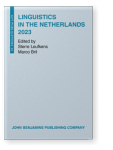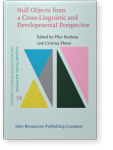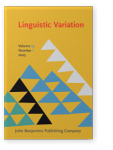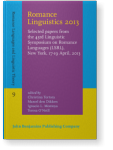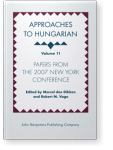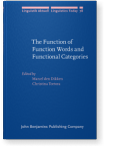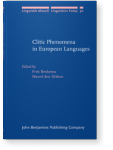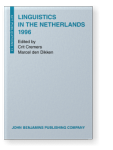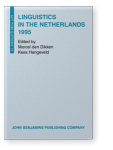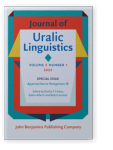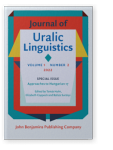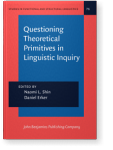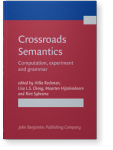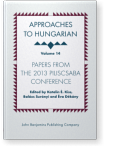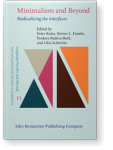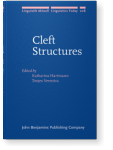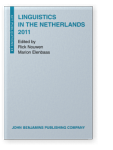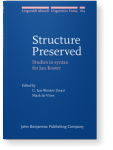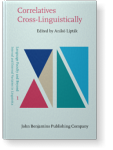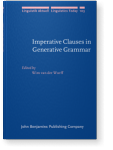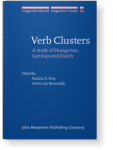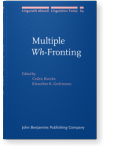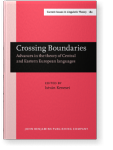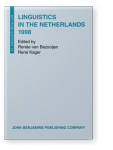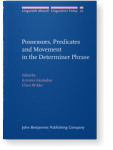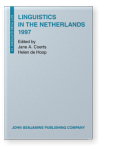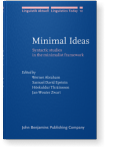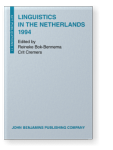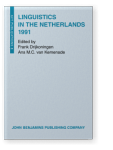Marcel den Dikken
List of John Benjamins publications for which Marcel den Dikken plays a role.
Yearbooks
Book series
Journal
Romance Linguistics 2013: Selected papers from the 43rd Linguistic Symposium on Romance Languages (LSRL), New York, 17-19 April, 2013
Edited by Christina Tortora, Marcel den Dikken, Ignacio L. Montoya and Teresa O'Neill
[Romance Languages and Linguistic Theory, 9] 2016. xix, 418 pp.
Subjects Romance linguistics | Theoretical linguistics
Approaches to Hungarian: Volume 11: Papers from the 2007 New York Conference
Edited by Marcel den Dikken and Robert M. Vago
[Approaches to Hungarian, 11] 2009. ix, 280 pp.
Subjects Generative linguistics | Syntax | Theoretical linguistics | Uralic languages
The Function of Function Words and Functional Categories
Edited by Marcel den Dikken and Christina Tortora
[Linguistik Aktuell/Linguistics Today, 78] 2005. vii, 292 pp.
Subjects Generative linguistics | Germanic linguistics | Syntax | Theoretical linguistics
Clitic Phenomena in European Languages
Edited by Frits Beukema and Marcel den Dikken
[Linguistik Aktuell/Linguistics Today, 30] 2000. x, 320 pp.
Subjects Balto-Slavic linguistics | Syntax | Theoretical linguistics
Linguistics in the Netherlands 1996
Edited by Crit Cremers and Marcel den Dikken
[Linguistics in the Netherlands, 13] 1996. x, 268 pp.
Subjects Theoretical linguistics
Linguistics in the Netherlands 1995
Edited by Marcel den Dikken and Kees Hengeveld
[Linguistics in the Netherlands, 12] 1995. x, 238 pp.
Subjects Theoretical linguistics
2023 Associative plurals and their associates: An integrated approach to the nominal plural markers of Hungarian Approaches to Hungarian 18: Special issue of the Journal of Uralic Linguistics 2:1 (2023), Farkas, Donka F., Gábor Alberti and Balázs Surányi (eds.), pp. 50–73 | Article
This paper presents an integrated approach to the morphosyntax of the three nominal plural markers of Hungarian: multiplicative -k, possessive -i, and associative plural -ék. It explicates the relationship between the associative and multiplicative plural markers, and between the associative… read more
2023 The morphosyntax of the Hungarian sociative and dissociative suffixes Approaches to Hungarian 18: Special issue of the Journal of Uralic Linguistics 2:1 (2023), Farkas, Donka F., Gábor Alberti and Balázs Surányi (eds.), pp. 74–95 | Article
This paper examines the morphosyntax of (dis)sociative ‘with(out)’, with particular reference to the facts of Hungarian but with an eye towards universality. The morphological analysis of -stul/stül ‘with’ and -talanul/telenül ‘without’ unpacks these complex forms, utilizing a variety of… read more
2022 Ordinals, reflexives and unaccusatives: Unification by predication Approaches to Hungarian 17: Special issue of the Journal on Uralic Linguistics 1:2 (2022), Halm, Tamás, Elizabeth Coppock and Balázs Surányi (eds.), pp. 215–238 | Article
This paper presents a unified outlook on the syntax of constructions featuring the reflexive clitic se, with particular emphasis on the uniform morphosyntax of the Hungarian element -ik, treated as an exponent of se both in the verbal domain and in the nominal domain (in ordinal numeral… read more
2018 An incomplete disquisition against ‘incomplete acquisition’: With particular reference to changes in the distribution of the subjunctive in Spanish Questioning Theoretical Primitives in Linguistic Inquiry: Papers in honor of Ricardo Otheguy, Shin, Naomi and Daniel Erker (eds.), pp. 269–290 | Chapter
This chapter presents a multi-pronged argument, from a generative syntactic perspective, against the notion of ‘incomplete acquisition,’ centered on subjunctive usage by Spanish heritage speakers in New York City. Special attention is paid to the distribution of the subjunctive in futurate cuando… read more
2017 Chapter 13. Stacking up for the long way down Crossroads Semantics: Computation, experiment and grammar, Reckman, Hilke, Lisa Lai-Shen Cheng, Maarten Hijzelendoorn and Rint Sybesma (eds.), pp. 207–225 | Chapter
Abstract
In Categorial Grammar, “[t]he combinatorics of long-distance dependencies are steered … by conditions on the state of argument stacks” (Cremers 2004: 99). In this paper I argue that in mainstream Chomskyan syntax, modelling filler-gap dependencies in these terms also works… read more
2016 Introduction Romance Linguistics 2013: Selected papers from the 43rd Linguistic Symposium on Romance Languages (LSRL), New York, 17-19 April, 2013, Tortora, Christina, Marcel den Dikken, Ignacio L. Montoya and Teresa O'Neill (eds.), pp. vii–xx | Article
2015 The morphosyntax of (in)alienably possessed noun phrases: The Hungarian contribution Approaches to Hungarian: Volume 14: Papers from the 2013 Piliscsaba Conference, Kiss, Katalin É., Balázs Surányi and Éva Dékány (eds.), pp. 121–145 | Article
This paper argues that there is a fundamental difference between alienable and inalienable possession in the syntax of the noun phrase, and that this difference involves direction of predication. A possessum is the subject of a predicate that is or contains the possessor; the configurational… read more
2014 On feature interpretability and inheritance Minimalism and Beyond: Radicalizing the interfaces, Kosta, Peter, Steven L. Franks, Teodora Radeva-Bork and Lilia Schürcks (eds.), pp. 37–55 | Article
The aim of this paper is to evaluate the theoretical motivations given for feature inheritance, and the workings and distribution thereof. The standard motivations for feature inheritance in the literature are shown not to be tenable. The rationale for feature inheritance given in the literature is… read more
2013 Predication and specification in the syntax of cleft sentences Cleft Structures, Hartmann, Katharina and Tonjes Veenstra (eds.), pp. 35–70 | Article
This paper reviews the differences between predicational and specificational copular sentences in the realm of (pseudo-)cleft constructions, and proposes an analysis which treats the it of specificational it-clefts as a pro-predicate that inverts with its subject in the course of the syntactic… read more
2011 Doubling PPs in Flemish dialects Linguistics in the Netherlands 2011, Nouwen, Rick and Marion Elenbaas (eds.), pp. 1–13 | Article
2010 Embedded inversion and successive cyclicity Structure Preserved: Studies in syntax for Jan Koster, Zwart, Jan-Wouter and Mark de Vries (eds.), pp. 101–108 | Article
2009 Comparative correlatives and successive cyclicity Correlatives Cross-Linguistically, Lipták, Anikó (ed.), pp. 263–306 | Article
2009 Arguments for successive-cyclic movement through SpecCP Linguistic Variation Yearbook 2009, van Craenenbroeck, Jeroen (ed.), pp. 89–126 | Article
Successive-cyclic A'–Cmovement derivations exploiting SpecCP as an intermediate landing-site deserve careful scrutiny. As a companion to Den Dikken’s (2009a) case for a typology of A'–Cdependencies that includes successive-cyclic movement via vP–edges, resumptive prolepsis, and scope marking, but… read more
2007 Clitic climbing in Spanish imperatives Imperative Clauses in Generative Grammar: Studies in honour of Frits Beukema, Wurff, Wim van der (ed.), pp. 135–152 | Article
In Spanish, the aspectual verbs ‘come’ and ‘go’ allow an object clitic to climb out of their infinitival complement in finite and infinitival contexts but not in simple imperatives. This paper argues that the ban on clitic climbing in simple imperatives with aspectual ‘come’ and ‘go’ (not noted in… read more
2005 Introduction: The Function of Function Words and Functional Categories The Function of Function Words and Functional Categories, Dikken, Marcel den and Christina Tortora (eds.), pp. 1–10 | Article
2004 Agreement and ‘clause union’ Verb Clusters: A study of Hungarian, German and Dutch, Kiss, Katalin É. and Henk van Riemsdijk (eds.), pp. 445–498 | Article
2003 On the morphosyntax of wh-movement Multiple Wh-Fronting, Boeckx, Cedric and Kleanthes K. Grohmann (eds.), pp. 77–98 | Article
1998 (Anti-)Agreement in DP Linguistics in the Netherlands 1998, Bezooijen, Renée van and René Kager (eds.), pp. 95–107 | Article
1998 Predicate Inversion in DP Possessors, Predicates and Movement in the Determiner Phrase, Alexiadou, Artemis and Chris Wilder (eds.), pp. 177–214 | Article
1997 Csoda Egy Nyelv — Nominal-Internal Predication in Hungarian Linguistics in the Netherlands 1997, Coerts, Jane A. and Helen de Hoop (eds.), pp. 61–72 | Article
1996 Preface Linguistics in the Netherlands 1996, Cremers, Crit and Marcel den Dikken (eds.), p. | Miscellaneous
1996 The Minimal Links of Verb (Projection) Raising Minimal Ideas: Syntactic studies in the minimalist framework, Abraham, Werner, Samuel David Epstein, Höskuldur Thráinsson and Jan-Wouter Zwart (eds.), pp. 67–96 | Article
1995 Preface Linguistics in the Netherlands 1995, Dikken, Marcel den and Kees Hengeveld (eds.), p. | Miscellaneous
1994 Predicate inversion and minimality Linguistics in the Netherlands 1994, Bok-Bennema, Reineke and Crit Cremers (eds.), pp. 1–12 | Article
1991 Serial Verbs, 'Object Sharing', and the Analysis of Dative Shift Linguistics in the Netherlands 1991, Drijkoningen, Frank and Ans M.C. van Kemenade (eds.), pp. 31–40 | Article

